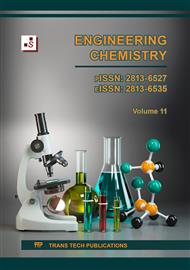[1]
J. Kabuba, A.V. Maliehe, Application of neural network techniques to predict the heavy metals in acid mine drainage from South African mines, Water Science and Technology 84 (2021) 3489–3507.
DOI: 10.2166/wst.2021.494
Google Scholar
[2]
N.A.A. Qasem, R.H. Mohammed, D.U. Lawal, Removal of heavy metal ions from wastewater: a comprehensive and critical review, NPJ Clean Water 4 (2021).
DOI: 10.1038/S41545-021-00127-0
Google Scholar
[3]
S. Bin Kang, Z. Wang, S.W. Won, Evaluation of Adsorption and Desorption Properties of PAAPSBF for Cd(II) from Aqueous Solution, Chem Eng Trans 89 (2021) 259–264.
Google Scholar
[4]
Asma Ashraf, Joydeep Dutta, Aiman Farooq, Mohd. Rafatullah, Kaushik Pal, George Z. Kyzas, Chitosan-based materials for heavy metal adsorption: Recent advancements, challenges and limitations, J Mol Struct 1309 (2024).
DOI: 10.1016/j.molstruc.2024.138225
Google Scholar
[5]
P.O. Osifo, The use of chitosan beads for the adsorption and regeneration of heavy metals, (2007) 156. https://repository.nwu.ac.za/bitstream/handle/10394/1635/osifo_petero.pdf? sequence=1&isAllowed=y.
Google Scholar
[6]
E. Igberase, P. Osifo, A. Ofomaja, The Adsorption of Pb, Zn, Cu, Ni, and Cd by Modified Ligand in a Single Component Aqueous Solution: Equilibrium, Kinetic, Thermodynamic, and Desorption Studies, Int J Anal Chem 2017 (2017).
DOI: 10.1155/2017/6150209
Google Scholar
[7]
S. Kim, S.N. Nam, A. Jang, M. Jang, C.M. Park, A. Son, N. Her, J. Heo, Y. Yoon, Review of adsorption–membrane hybrid systems for water and wastewater treatment, Chemosphere 286 (2022).
DOI: 10.1016/j.chemosphere.2021.131916
Google Scholar
[8]
D. A.O, Langmuir, Freundlich, Temkin and Dubinin–Radushkevich Isotherms Studies of Equilibrium Sorption of Zn 2+ Unto Phosphoric Acid Modified Rice Husk, IOSR Journal of Applied Chemistry 3 (2012) 38–45.
DOI: 10.9790/5736-0313845
Google Scholar
[9]
R. Bargagli, Moss and lichen biomonitoring of atmospheric mercury: A review, Science of the Total Environment 572 (2016) 216–231.
DOI: 10.1016/j.scitotenv.2016.07.202
Google Scholar
[10]
C. Dong, F. Zhang, Z. Pang, G. Yang, Efficient and selective adsorption of multi-metal ions using sulfonated cellulose as adsorbent, Carbohydr Polym 151 (2016) 230–236.
DOI: 10.1016/j.carbpol.2016.05.066
Google Scholar
[11]
L. Zhang, Y. Zeng, Z. Cheng, Removal of heavy metal ions using chitosan and modified chitosan: A review, J Mol Liq 214 (2016) 175–191. https://doi.org/10.1016/j.molliq. 2015.12.013.
DOI: 10.1016/j.molliq.2015.12.013
Google Scholar
[12]
M. Banza, H. Rutto, T. Seodigeng, Application of Artificial Neural Network and Shrinking Core Model for Copper (Ii) and Lead (Ii) Leaching from Contaminated Soil Using Ethylenediaminetetraacetic Acid, Soil Sediment Contam (2023). https://doi.org/10.1080/ 15320383.2023.2178384.
DOI: 10.1080/15320383.2023.2178384
Google Scholar
[13]
P.O. Osifo, A. Webster, H. van der Merwe, H.W.J.P. Neomagus, M.A. van der Gun, D.M. Grant, The influence of the degree of cross-linking on the adsorption properties of chitosan beads, Bioresour Technol 99 (2008) 7377–7382. https://doi.org/10.1016/j.biortech. 2008.01.053.
DOI: 10.1016/j.biortech.2008.01.053
Google Scholar
[14]
E. Igberase, P.O. Osifo, Mathematical modelling and simulation of packed bed column for the efficient adsorption of Cu(II) ions using modified bio-polymeric material, J Environ Chem Eng 7 (2019).
DOI: 10.1016/j.jece.2019.103129
Google Scholar
[15]
H.E. Abdelwahab, M. Elhag, M.M. El Sadek, Removal of As(V) and Cr(VI) using quinoxaline chitosan schiff base: synthesis, characterization and adsorption mechanism, BMC Chem 18 (2024).
DOI: 10.1186/s13065-024-01328-7
Google Scholar
[16]
E. Igberase, P.O. Osifo, Application of diethylenetriamine grafted on glyoxal cross-linked chitosan composite for the effective removal of metal ions in batch system, Int J Biol Macromol 134 (2019).
DOI: 10.1016/j.ijbiomac.2019.05.179
Google Scholar
[17]
L.D. Pompeu, P.C.L. Muraro, G. Chuy, B.S. Vizzotto, G. Pavoski, D.C.R. Espinosa, L. da Silva Fernandes, W.L. da Silva, Adsorption for rhodamine b dye and biological activity of nano-porous chitosan from shrimp shells, Environmental Science and Pollution Research 29 (2022) 49858–49869.
DOI: 10.1007/s11356-022-19259-y
Google Scholar
[18]
N. Can, B.C. Ömür, A. Altındal, Modeling of heavy metal ion adsorption isotherms onto metallophthalocyanine film, Sens Actuators B Chem 237 (2016) 953–961.
DOI: 10.1016/j.snb.2016.07.026
Google Scholar
[19]
E. Igberase, A. Ofomaja, P.O. Osifo, Enhanced heavy metal ions adsorption by 4-aminobenzoic acid grafted on chitosan/epichlorohydrin composite: Kinetics, isotherms, thermodynamics and desorption studies, Int J Biol Macromol 123 (2019).
DOI: 10.1016/j.ijbiomac.2018.11.082
Google Scholar
[20]
C. Bulin, T. Guo, Ultra fast and highly efficient recovery of cadmium with graphene oxide-chitosan grafted by nickel ferrite as a recyclable adsorbent and atomic scale mechanism, Science of the Total Environment 991 (2025). https://doi.org/10.1016/j.scitotenv. 2025.179974.
DOI: 10.1016/j.scitotenv.2025.179974
Google Scholar
[21]
H. Li, K. Han, J. Shang, W. Cai, M. Pan, D. Xu, C. Du, R. Zuo, Comparison of Adsorption Capacity and Removal Efficiency of Strontium by Six Typical Adsorption Materials, Sustainability (Switzerland) 14 (2022).
DOI: 10.3390/su14137723
Google Scholar
[22]
M.A. Kaczorowska, D. Bożejewicz, The Application of Chitosan-Based Adsorbents for the Removal of Hazardous Pollutants from Aqueous Solutions—A Review, Sustainability (Switzerland) 16 (2024).
DOI: 10.3390/su16072615
Google Scholar
[23]
H. Li, K. Han, J. Shang, W. Cai, M. Pan, D. Xu, C. Du, R. Zuo, Comparison of Adsorption Capacity and Removal Efficiency of Strontium by Six Typical Adsorption Materials, Sustainability (Switzerland) 14 (2022).
DOI: 10.3390/su14137723
Google Scholar
[24]
X. qi Liu, X. xin Zhao, Y. Liu, T. an Zhang, Review on preparation and adsorption properties of chitosan and chitosan composites, Polymer Bulletin 79 (2022) 2633–2665.
DOI: 10.1007/s00289-021-03626-9
Google Scholar
[25]
U. Haripriyan, K.P. Gopinath, J. Arun, Chitosan based nano adsorbents and its types for heavy metal removal: A mini review, Mater Lett 312 (2022).
DOI: 10.1016/j.matlet.2022.131670
Google Scholar
[26]
A. Singh, N. Singh, N. Kaur, D.O. Jang, Chitosan-poly(vinyl alcohol)-ionic liquid-grafted hydrogel for treating wastewater, New Journal of Chemistry 47 (2023) 11196–11209.
DOI: 10.1039/D3NJ01384G
Google Scholar
[27]
P.O. Osifo, A. Webster, H. van der Merwe, H.W.J.P. Neomagus, M.A. van der Gun, D.M. Grant, The influence of the degree of cross-linking on the adsorption properties of chitosan beads, Bioresour Technol 99 (2008) 7377–7382. https://doi.org/10.1016/ J.BIORTECH.2008.01.053.
DOI: 10.1016/j.biortech.2008.01.053
Google Scholar


